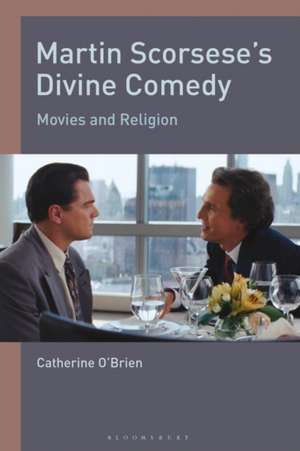Martin Scorsese's Divine Comedy: Movies and Religion
Autor Catherine O'Brienen Limba Engleză Paperback – 27 noi 2019
| Toate formatele și edițiile | Preț | Express |
|---|---|---|
| Paperback (1) | 230.24 lei 6-8 săpt. | |
| Bloomsbury Publishing – 27 noi 2019 | 230.24 lei 6-8 săpt. | |
| Hardback (1) | 714.77 lei 3-5 săpt. | |
| Bloomsbury Publishing – 16 mai 2018 | 714.77 lei 3-5 săpt. |
Preț: 230.24 lei
Preț vechi: 264.77 lei
-13% Nou
Puncte Express: 345
Preț estimativ în valută:
44.06€ • 45.52$ • 36.67£
44.06€ • 45.52$ • 36.67£
Carte tipărită la comandă
Livrare economică 25 martie-08 aprilie
Preluare comenzi: 021 569.72.76
Specificații
ISBN-13: 9781350141605
ISBN-10: 1350141607
Pagini: 224
Ilustrații: 25 bw illus
Dimensiuni: 153 x 234 mm
Greutate: 0.32 kg
Editura: Bloomsbury Publishing
Colecția Bloomsbury Academic
Locul publicării:London, United Kingdom
ISBN-10: 1350141607
Pagini: 224
Ilustrații: 25 bw illus
Dimensiuni: 153 x 234 mm
Greutate: 0.32 kg
Editura: Bloomsbury Publishing
Colecția Bloomsbury Academic
Locul publicării:London, United Kingdom
Caracteristici
The first full-length study of Scorsese to explore the religious and theological dimensions of his feature films, from Who's that Knocking at my door (1967) to Silence (2016)
Notă biografică
Catherine O'Brien is Co-director of the Centre for Marian Studies, UK, and was Senior Lecturer in Film Studies and French at Kingston University, UK. She is the author of The Celluloid Madonna (2011) and Women's Fictional Responses to the First World War (1997), and co-editor of Sacred Spaces/Forbidden Places (2000).
Cuprins
AcknowledgmentsIntroductionPart One. Inferno: Visions of Hell1. Hell on Earth2. Sympathy for the Devil3. TreacheryPart Two. Purgatory: The Three Story Mountain4. Misdirected love5. Insufficient love6. Excessive lovePart Three. Paradise: (Lost or Found?)7. Encountering Jesus8. The compassion connection9. The mystery of God's loveConclusionBibliographyFilmographyIndex
Recenzii
O'Brien's text is a welcome contribution and achieves a unique goal in the scholarship on Scorsese, as well as film and religion. This will be an indispensable text for scholars and admirers of Scorsese alike, and it is a case study in how focused religious interpretation of film should be done. One of the highest compliments that can be paid to the author is that the work not only sheds new light on and offers passionate, fresh interpretation of an abundantly studied filmmaker, but the text itself is as engrossing, provocative, and contemplative as the films that are the subject of its investigation. This is sure to be an essential text for course adoption, students, and even general readers, especially if a paperback edition ismade available.
Contains a rich, in-depth analysis of both the film [Silence]'s narrative content and formal aesthetic ... O'Brien's focused reading of Father Rodrigues' apostasy as kenosis (pp. 180-91) is exceptional, and reflects what film theology can offer if it takes both cinema and theology seriously. Indeed, theologians and ministers would greatly benefit from reading O'Brien's book in conjunction with a viewing of Silence.
Catherine O'Brien goes beyond merely suggesting that Scorsese was influenced by Catholicism as a child to demonstrate the many ways Catholicism permeates the mise-en-scene, plot, character development, and even editing of his films. There is an immanent theology at work in his films, and O'Brien is an able guide through their cinematic layers.
An enriching and innovative inter-disciplinary study, this book draws on debates at the heart of religious studies, theology, eschatology, literature and film. This is an imaginative book which is keen to do something different to existing scholarship on Scorsese.
Passionate, lively, and well researched, Catherine O'Brien's book synthetically mines Martin Scorsese's oeuvre -- unpacking with particular aplomb his own Divine Comedy-ripe admission to being, as an artist, "both gangster and priest.
The Divine Comedy illustrated and illuminated by Martin Scorsese. The films of Martin Scorsese explored and illuminated by Dante. Much Inferno, some Purgatorio, Hopes for Paradiso. Evoking many cinema experiences and memories by an author who has immersed herself in extraordinary detail of the themes and the director's film-making - for fans and students alike. And many surprising ah-ah moments.
Contains a rich, in-depth analysis of both the film [Silence]'s narrative content and formal aesthetic ... O'Brien's focused reading of Father Rodrigues' apostasy as kenosis (pp. 180-91) is exceptional, and reflects what film theology can offer if it takes both cinema and theology seriously. Indeed, theologians and ministers would greatly benefit from reading O'Brien's book in conjunction with a viewing of Silence.
Catherine O'Brien goes beyond merely suggesting that Scorsese was influenced by Catholicism as a child to demonstrate the many ways Catholicism permeates the mise-en-scene, plot, character development, and even editing of his films. There is an immanent theology at work in his films, and O'Brien is an able guide through their cinematic layers.
An enriching and innovative inter-disciplinary study, this book draws on debates at the heart of religious studies, theology, eschatology, literature and film. This is an imaginative book which is keen to do something different to existing scholarship on Scorsese.
Passionate, lively, and well researched, Catherine O'Brien's book synthetically mines Martin Scorsese's oeuvre -- unpacking with particular aplomb his own Divine Comedy-ripe admission to being, as an artist, "both gangster and priest.
The Divine Comedy illustrated and illuminated by Martin Scorsese. The films of Martin Scorsese explored and illuminated by Dante. Much Inferno, some Purgatorio, Hopes for Paradiso. Evoking many cinema experiences and memories by an author who has immersed herself in extraordinary detail of the themes and the director's film-making - for fans and students alike. And many surprising ah-ah moments.
